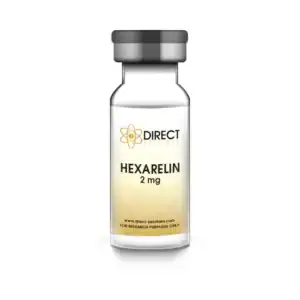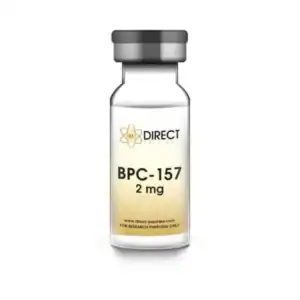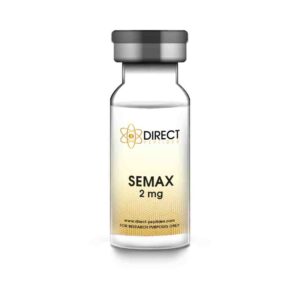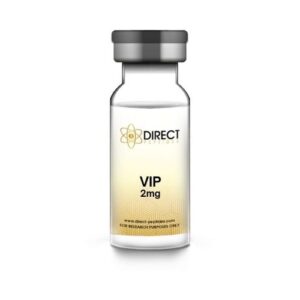Dementia is a condition that causes memory loss and cognitive decline. It affects millions worldwide. Researchers are studying new ways to treat and prevent it. One area of interest is peptides. These small compounds show potential in fighting dementia.
This article explores how peptides work in dementia research. It looks at different peptide types and their possible benefits. The focus is on factual details about peptides as tools for study. Note: These peptides are for research purposes only and not for human use.
Peptides are essential for brain function and optimal brain health. They influence neurotransmitters, help brain cells communicate, and protect neurons. These tiny molecules play a vital role in supporting complex physiological processes like the formation of new neurons and brain cells. They can impact memory, thinking, and overall brain health by improving brain chemistry.
Peptides also play a role in mood, sleep, and how the brain handles stress. They help regulate these functions for the brain to work at its best.
Defining Dementia
Dementia is a group of brain disorders that damage cognitive functions. It impacts memory, thinking, behavior, and the ability to do daily tasks, leading to reduced overall functionality.
The Growing Global Burden
Dementia is a big challenge for healthcare systems around the world. It is common and very costly. As more people live longer, the number of dementia cases will grow. This means we need new and creative ways to deal with this problem.
Peptides are short chains of amino acids, often called the building blocks of proteins. These small molecules are important for various biological processes, such as sending signals between cells, managing hormones, and helping the immune system. They can also target and support specific functions in the body.
Latvia Studies show that certain peptides could play a role in tackling the causes of dementia. Here are a few notable examples:
Aβ peptides play a role in forming amyloid plaques, which are a key feature of Alzheimer’s disease. A new study shows that targeting these peptides could help prevent plaque buildup and offer potential treatment benefits.
Neuropeptides like VIP play a key role in how neurons communicate. They are linked to various areas of the brain functions, especially those involving memory, learning, cognition, and the central nervous system.
Researchers are studying these peptides to explore their possible role in protecting brain cells and improving mental processes. Explore VIP from Direct Peptides Latvia, available in vials, nasal sprays and pre-mixed pens.
Emerging studies show that VIP impacts key factors in dementia, such as brain inflammation, neuron damage, and cell death. VIP works by attaching to specific brain receptors, influencing neurotransmitter release, and supporting neuron health and survival.
It helps regulate the immune system and supports brain-protective processes. While these findings hint at potential treatment options for dementia, research into how VIP interacts with the disease could uncover new ways to slow or prevent cognitive decline.
GHRPs help trigger the release of growth hormone and may protect brain cells. Early research shows they might boost thinking skills and slow brain diseases like dementia.
Researchers have studied the effects of GHRP-2 and GHRP-6 in mouse models. These studies focus on their potential to protect the brain and improve cognitive functions. Findings suggest these peptides may help support neuron health, improve synaptic plasticity, and reduce brain inflammation. This could mean they play a role in preventing or slowing dementia-related processes. Check out GHRP-2 from Direct Peptides Latvia.
While further investigation is needed to fully understand the therapeutic mechanisms and clinical applications, the potential of GHRP-2 and GHRP-6 in dementia research holds promise. Researchers, healthcare professionals, and individuals interested in exploring this emerging field can find high-quality peptides such as GHRP-6 and related products at Direct Peptides.
Explore Peptide Supplies at Direct Peptides for all your reconstitution requirements.
 Hexarelin has been shown in numerous studies to have neuroprotective properties. It may help with conditions like dementia. Research suggests that Hexarelin triggers the release of growth hormone. This process can support the growth of new brain cells and protect existing ones.
Hexarelin has been shown in numerous studies to have neuroprotective properties. It may help with conditions like dementia. Research suggests that Hexarelin triggers the release of growth hormone. This process can support the growth of new brain cells and protect existing ones.
Hexarelin also has anti-inflammatory and antioxidant effects. These may reduce inflammation in the brain and lower oxidative stress. Both of these factors are linked to the development of dementia.
Scientists are studying how Hexarelin works and its possible benefits. It may become a useful tool in dementia research. However, more studies are needed to confirm its safety, effectiveness, and correct dosage. Hexarelin is available online from Direct Peptides Latvia.
BDNF peptides are important for the growth, survival, and connections of neurons in the brain. These processes rely on a molecule called nicotinamide adenine dinucleotide (NAD+).
By increasing BDNF production, researchers aim to support the growth of new brain cells, improve brain function, and enhance mental clarity in dementia research.
 The impact of BPC-157 on brain-derived neurotrophic factor (BDNF) has drawn interest from researchers globally. BDNF is crucial for the growth, flexibility, and survival of neurons.
The impact of BPC-157 on brain-derived neurotrophic factor (BDNF) has drawn interest from researchers globally. BDNF is crucial for the growth, flexibility, and survival of neurons.
It plays a major role in keeping the brain functioning well and may help in recovering from traumatic brain injury and other brain injuries. Studies show that BPC-157 has strong neuroprotective effects. It increases BDNF levels and helps grow new neurons.
In addition, BPC-157 reduces cell death and inflammation, which could make it helpful in studying dementia. As scientists work to understand dementia and create better treatments, BPC-157 is emerging as a promising option.
Its ability to slow down damage in the brain and improve brain function—possibly by affecting potassium channels—makes it a fascinating topic for research.
For more information visit the BPC-157 Category Page.
Nootropic peptides are being studied for their potential benefits and ability to improve brain function and cognitive performance. Researchers are interested in their effects on memory, focus, and thinking skills. Studies also look at how they might help us understand conditions like dementia.
Latvia Research shows that Selank may have strong neuroprotective properties. It works on brain pathways linked to memory, learning, and neurotransmitters. Selank helps balance brain-derived neurotrophic factor (BDNF), which promotes the growth of new brain cells, strengthens connections between them, and boosts cognitive abilities. It also supports immune function and the immune system, all while avoiding unwanted side effects.
Selank also has anti-inflammatory and antioxidant properties. These may add to its potential value in treating dementia. Many studies in animals have shown that Selank can improve memory issues and lower brain inflammation. A recent study suggests that more clinical trials are needed to confirm its effects on humans. However, the early findings are promising and show potential for further research.
For more information visit the Selank Category Page.
As scientists explore new treatments for neurodegenerative disorders, Semax stands out as a promising option. This peptide appears to influence important brain functions, such as regulating neurotransmitters, protecting neurons, and supporting connections between brain cells.
Early studies suggest that Semax might boost cognitive function, improve memory retention, and potentially slow the progression of dementia. However, more research is needed to understand how it works and confirm its effects in medical studies.
For more information visit the Semax Category Page.
The potential of synthetic peptides and dementia research and treatment in transgenic mice is an exciting frontier, offering hope for individuals affected by neurodegenerative diseases and this debilitating condition.
Through this comprehensive guide, we have explored the fundamentals of peptides, their connection to nerve cells and dementia, and promising peptide candidates.
As scientists and researchers work towards unlocking the full potential of peptides, Direct Peptides remains committed to supporting and contributing to this important field of study.
Remember, for the latest information on peptides and to explore our range of high-quality peptide products, visit Direct Peptides.
All the peptides mentioned above are for research purposes only and are not intended for human use.
[1] Passemard S, Sokolowska P, Schwendimann L, Gressens P. VIP-induced neuroprotection of the developing brain. Curr Pharm Des. 2011;17(10):1036-9.
[2] Frago LM, Pañeda C, Dickson SL, Hewson AK, Argente J, Chowen JA. Growth hormone (GH) and GH-releasing peptide-6 increase brain insulin-like growth factor-I expression and activate intracellular signaling pathways involved in neuroprotection. Endocrinology. 2002 Oct;143(10):4113-22.
[3] Brywe KG, Leverin AL, Gustavsson M, Mallard C, Granata R, Destefanis S, Volante M, Hagberg H, Ghigo E, Isgaard J. Growth hormone-releasing peptide hexarelin reduces neonatal brain injury and alters Akt/glycogen synthase kinase-3beta phosphorylation. Endocrinology. 2005 Nov;146(11):4665-72.
[4] Sikiric P, Seiwerth S, Rucman R, Kolenc D, Vuletic LB, Drmic D, Grgic T, Strbe S, Zukanovic G, Crvenkovic D, Madzarac G, Rukavina I, Sucic M, Baric M, Starcevic N, Krstonijevic Z, Bencic ML, Filipcic I, Rokotov DS, Vlainic J. Brain-gut Axis and Pentadecapeptide BPC 157: Theoretical and Practical Implications. Curr Neuropharmacol. 2016;14(8):857-865.
[5] Volkova A, Shadrina M, Kolomin T, Andreeva L, Limborska S, Myasoedov N, Slominsky P. Selank Administration Affects the Expression of Some Genes Involved in GABAergic Neurotransmission. Front Pharmacol. 2016 Feb 18;7:31.
[6] Romanova GA, Silachev DN, Shakova FM, Kvashennikova YN, Viktorov IV, Shram SI, Myasoedov NF. Neuroprotective and antiamnesic effects of Semax during experimental ischemic infarction of the cerebral cortex. Bull Exp Biol Med. 2006 Dec;142(6):663-6. English, Russian.
Shop ALL Peptide Vials from Direct Peptides today, your trusted supplier of premium clinical grade peptides online.

TWIN PACKS
BPC-157 Peptide Vial
£11.46 – £61.88Price range: £11.46 through £61.88 Select options This product has multiple variants. The options may be chosen on the product page
Hexarelin Peptide Vial
£14.58 – £38.15Price range: £14.58 through £38.15 Select options This product has multiple variants. The options may be chosen on the product page
Semax Peptide Vial
£15.99 – £58.87Price range: £15.99 through £58.87 Select options This product has multiple variants. The options may be chosen on the product page
VIP Peptide Vial
£16.79 – £25.77Price range: £16.79 through £25.77 Select options This product has multiple variants. The options may be chosen on the product pageALL CONTENT AND PRODUCT INFORMATION AVAILABLE ON THIS WEBSITE IS FOR EDUCATIONAL PURPOSES ONLY.
DISCLAIMER: These products are intended solely as a research chemical only. This classification allows for their use only for research development and laboratory studies. The information available on our Latvia Direct Peptides website: https://direct-peptides.com is provided for educational purposes only. These products are not for human or animal use or consumption in any manner. Handling of these products should be limited to suitably qualified professionals. They are not to be classified as a drug, food, cosmetic, or medicinal product and must not be mislabelled or used as such.